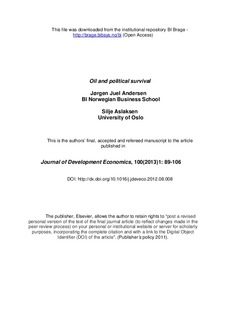| dc.contributor.author | Andersen, Jørgen Juel | |
| dc.contributor.author | Aslaksen, Silje | |
| dc.date.accessioned | 2012-10-30T11:44:30Z | |
| dc.date.available | 2012-10-30T11:44:30Z | |
| dc.date.issued | 2013 | |
| dc.identifier.issn | 1872-6089 | |
| dc.identifier.uri | http://hdl.handle.net/11250/93724 | |
| dc.description | This is the authors’ final, accepted and refereed manuscript to the article | no_NO |
| dc.description.abstract | Political economy theories on the “natural resource curse” predict that natural resource wealth is a determining factor for the length of time political leaderships remain in office. Whether resource wealth leads to longer or shorter durations in political office depends on the political incentives created by the natural resources, which in turn depend on the types of institutions and natural resource. Exploiting a sample of more than 600 political leadership durations in up to 152 countries, we find that both institutions and resource types matter for the effect that natural resource wealth has on political survival:
(i) wealth derived from natural resources affects political survival in intermediate and autocratic, but not in democratic, polities; and
(ii) while oil and non-lootable diamonds are associated with positive effects on the duration in political office, minerals are associated with negative duration effects. | no_NO |
| dc.language.iso | eng | no_NO |
| dc.publisher | Elsevier | no_NO |
| dc.subject | political survival | no_NO |
| dc.subject | oil | no_NO |
| dc.subject | natural resources | no_NO |
| dc.subject | institutions | no_NO |
| dc.title | Oil and political survival | no_NO |
| dc.type | Journal article | no_NO |
| dc.type | Peer reviewed | no_NO |
| dc.source.pagenumber | 89-106 | no_NO |
| dc.source.volume | 100 | no_NO |
| dc.source.journal | Journal of Development Economics | no_NO |
| dc.source.issue | 1 | no_NO |
| dc.identifier.doi | 10.1016/j.jdeveco.2012.08.008 | |
